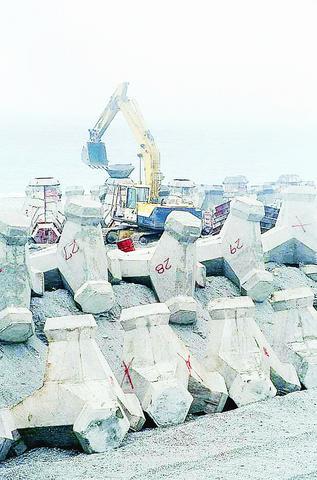Inappropriate civil construction carried out by the government to prevent damage caused by violent waves to coastal areas in eastern counties, including Hualien and Taitung, are harming not only gorgeous scenery but also precious ecological systems, legislators and environmentalists said yesterday.
At a press conference held at the Legislative Yuan, conservationists from the Taiwan Environmental Protection Union's Hualien chapter displayed photos showing significant changes to the well-known scenic spot, Seven Star Beach in Hualien.
The photographs were taken before and after construction of a 32m artificial structure composed of wave-killing tetrapods, designed to break up wave action, and irregularly stacked boulders.

PHOTO: OFFICE OF LEGISLATOR EUGENE JAO
Environmentalists said that the NT$8.8 million construction pro-ject was launched last month even though no scientific evidence supporting its necessity was available.
"It is just one of many disappointing cases, which are carried out to satisfy greedy local political figures rather than to protect the coastline," said Chung Pao-chu (鍾寶珠), head of the chapter.
Tsai Wan-kung (
According to DPP legislator Eugene Jao (趙永清), the government spent NT$2.36 billion building 8,566 5m high wave-killing tetrapods in Hualien County. About 85 percent of wave-killing tetrapods in Taiwan are built in eastern Hualien and Taitung counties.
"Carrying out these construction projects, which are depleting the national treasury and destroying natural resources in eastern Taiwan, is contradictory to all our resolutions to promote sustainable development," Jao said.
WRA officials said that increasing development and population growth have left coastal areas more vulnerable to a variety of hazards, including huge waves. WRA statistics show that along Taiwan's 1,500km-long coastline, 50km has been reinforced by wave-killing tetrapods and an additional 500km by breakwaters.
The construction at Seven Star Beach, scheduled to be completed in August, was halted last week due to strong local opposition.
WRA Deputy Chen Shen-hsien (陳伸賢) said that planting vegetation or establishing windbreaking forests might be ways to mitigate damage to the coastline.
"We will do our best to communicate with residents, showing our sincerity toward not only flood-disaster prevention but also coastal protection," Chen said.
Scientific researchers also urged the government to review the project and take biodiversity into account.
"In Hualien, we've seen a rapid drop in the number of crabs in coastal areas. This can be attributed to the environmentally-unfriendly constructions that are erected to prevent damage by huge waves," said Jeng Ming-shiou (鄭明修), a zoologist at Academia Sinica.
Chiau Wen-yan (
"We have to respect the dynamic equilibrium in nature, and try to find out how artificial structures might damage the natural coastline," Chiau said.

Chinese spouse and influencer Guan Guan’s (關關) residency permit has been revoked for repeatedly posting pro-China videos that threaten national security, the National Immigration Agency confirmed today. Guan Guan has said many controversial statements in her videos posted to Douyin (抖音), including “the red flag will soon be painted all over Taiwan” and “Taiwan is an inseparable part of China,” and expressing hope for expedited reunification. The agency last year received multiple reports alleging that Guan Guan had advocated for armed reunification. After verifying the reports, the agency last month issued a notice requiring her to appear and explain her actions. Guan

A preclearance service to facilitate entry for people traveling to select airports in Japan would be available from Thursday next week to Feb. 25 at Taiwan Taoyuan International Airport, Taoyuan International Airport Corp (TIAC) said on Tuesday. The service was first made available to Taiwanese travelers throughout the winter vacation of 2024 and during the Lunar New Year holiday. In addition to flights to the Japanese cities of Hakodate, Asahikawa, Akita, Sendai, Niigata, Okayama, Takamatsu, Kumamoto and Kagoshima, the service would be available to travelers to Kobe and Oita. The service can be accessed by passengers of 15 flight routes operated by

GIVE AND TAKE: Blood demand continues to rise each year, while fewer young donors are available due to the nation’s falling birthrate, a doctor said Blood donors can redeem points earned from donations to obtain limited edition Formosan black bear travel mugs, the Kaohsiung Blood Center said yesterday, as it announced a goal of stocking 20,000 units of blood prior to the Lunar New Year. The last month of the lunar year is National Blood Donation Month, when local centers seek to stockpile blood for use during the Lunar New Year holiday. The blood demand in southern Taiwan — including Tainan and Kaohsiung, as well as Chiayi, Pingtung, Penghu and Taitung counties — is about 2,000 units per day, the center said. The donation campaign aims to boost

The Central Weather Administration (CWA) said a magnitude 4.9 earthquake that struck off the coast of eastern Taiwan yesterday was an independent event and part of a stress-adjustment process. The earthquake occurred at 4:47pm, with its epicenter at sea about 45.4km south of Yilan County Hall at a depth of 5.9km, the CWA said. The quake's intensity, which gauges the actual effects of a temblor, was highest in several townships in Yilan and neighboring Hualien County, where it measured 4 on Taiwan's seven-tier intensity scale, the CWA said. Lin Po-yu (林柏佑), a division chief at the CWA's Seismological Center, told a news conference